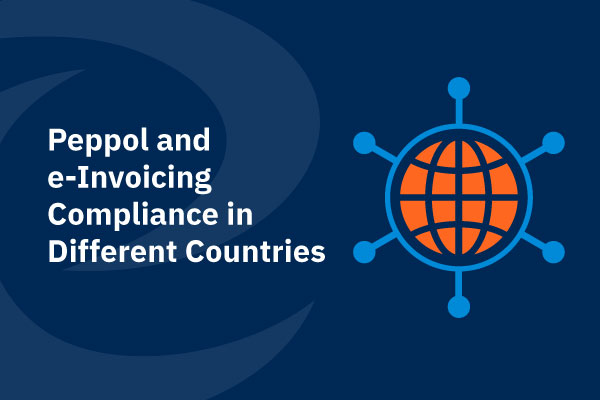Peppol and Global E-invoicing Compliance

September 12, 2025
E-invoicing mandates are being introduced in more and more countries around the world. As part of this, Peppol is also gaining popularity, since many countries are making it part of their official requirements. Peppol has already been widely used for business-to-government (B2G) invoicing, but we now see it expanding into business-to-business (B2B) as well. This means it’s a term you are likely to come across more often in the future.
If you want a general introduction to Peppol, you can find that in our main blog post where we explain how it works. In this blog post, we’ll take a closer look at the specific requirements country by country.
Peppol adoption
- Europe (EU countries): Many EU countries are increasingly adopting or choosing Peppol as the preferred network and format for public procurement and e-invoicing (e.g.Belgium and Germany)
- Singapore: Leading in Asia, Peppol is one of the preferred methods for e-invoicing there and is heavily used in public procurement.
- Australia: Also developing as a Peppol hub; the Australian Federal Agency for Digital Transformation provides official support.
National E-invoicing Timelines & Commitments
- EU: Directive 2014/55/EU has required contracting authorities to accept electronic invoices since 2019, increasing focus on Peppol.
- Ireland / UK / Germany:
- In Germany, e-invoicing has been mandatory for federal suppliers since November 2020; Peppol is a supported transfer option.
- Ireland is experimenting with pilot projects for e-invoicing in the public sector.
- The UK uses Peppol particularly in public procurement (i.e. NHS), with clear deadlines for implementation.
- Singapore / Australia: Singapore requires e-invoicing in the B2G environment and promotes Peppol. In Australia, the timeline is limited to pilot phases and gradual scaling.
Local Peppol authorities and service providers
To ensure smooth and standardized e-invoicing across borders, each country designates national authorities or accredited service providers to manage Peppol access. These entities oversee compliance, certification, and connectivity within their respective regions. The following examples highlight how different countries organize their Peppol governance and approved service providers:
- Germany: National Clearing House / certified Peppol Access Point (e.g. B. portals of e-invoicing providers).
- Ireland & UK: Designated authorities or contracts with approved Peppol providers, often through public procurement bodies.
- Singapore: The Infocomm Media Development Authority (IMDA) is central Peppol Authority.
- Australia: Digital Transformation Agency and tech suppliers coordinate Peppol integration.
TrueCommerce is a certified Peppol Access Point.
Introduction: Peppol adoption worldwide
PEPPOL was originally developed in the EU context but is now used globally. By March 2025, over 1.4 million organizations in 98 countries were registered as Peppol participants.
Outside Europe, countries such as Singapore (since May 2018), Japan (from September 2021), Australia, and New Zealand operate as independent Peppol organizations. Authorities.
European countries: Peppol mandates & timelines
| country | B2G mandate (public) | B2B-E Invoicing (private sector) | Format / Standard | Peppol Authority / Responsible |
| Germany | Obligation to receive since 27 Nov 2018 | Issuance obligation phased in until 2025 to 2028 | XRechnung CIUS + optional Peppol UP TO 3.0 | KoSIT (Coordination Office for IT Standards) |
| Italy | invoicing since 2015 | Fully mandatory since 1 Jan 2019 | FatturaPA / Peppol BIS via AgID Register | AgID (Agenzia per l’Italia Digitale) |
| Austria | From 1 January 2014 implement mandatory electronic invoicing | B2B not yet mandatory | Peppol BIS or USP / ebInterface | Federal authority according to IKTKonG |
| Norway | Mandatory since July 2012 in the public sector | B2B voluntary | EHF Billing 3.0 based on Peppol BIS & UBL | DFØ / Norway. Authorities |
| Sweden | Mandatory for authorities (from 1 April 2019) | Private sector voluntary | Svefaktura (UBLprofile) / Peppol BIS | Government / SKLESV |
| Ireland | B2G e -Invoice mandatory in consideration, Peppol used | B2B voluntary | Peppol BIS format | Public Government of Ireland |
| Netherlands | Centrally governed since 2017; Public entities required to receive and process structured eInvoices | B2B under development, no general mandate | UBLOHNL / SimplerInvoicing / Peppol BIS 3.0 | National authorities |
| France | Since 1 Jan 2020 B2G via national platform (e.g. Chorus Pro) | B2B rollout planned from 2026–27 | Factur X / Peppol BIS 3.0 possible | National e- invoice platform providers |
| Belgium | B2G e-invoicing mandatory in the future (from 2026), B2B mandatory from 2026 | national e fff / Peppol BIS planned | Peppol BIS | Belgian government via Peppol Authority |
| Spain | B2G since 2015 (FACe ) | B2B planned from 2027 | national standards / integration with Peppol under discussion | Spanish Tax authority: Agencia Estatal de Administración Tributaria (AEAT) |
The rules and timelines for e-invoicing are constantly changing from country to country. What is planned today might be delayed, updated, or replaced tomorrow, which makes it difficult for companies to keep track of everything. This complexity is exactly why many organisations look for a partner who can guide them through the different national requirements. We support companies globally in meeting local e-invoicing rules, so if you want to make sure you stay compliant everywhere you do business, get in touch with us.
Share this post:
Stay ahead of the competition
Get expert supply chain insights delivered directly to your inbox weekly.